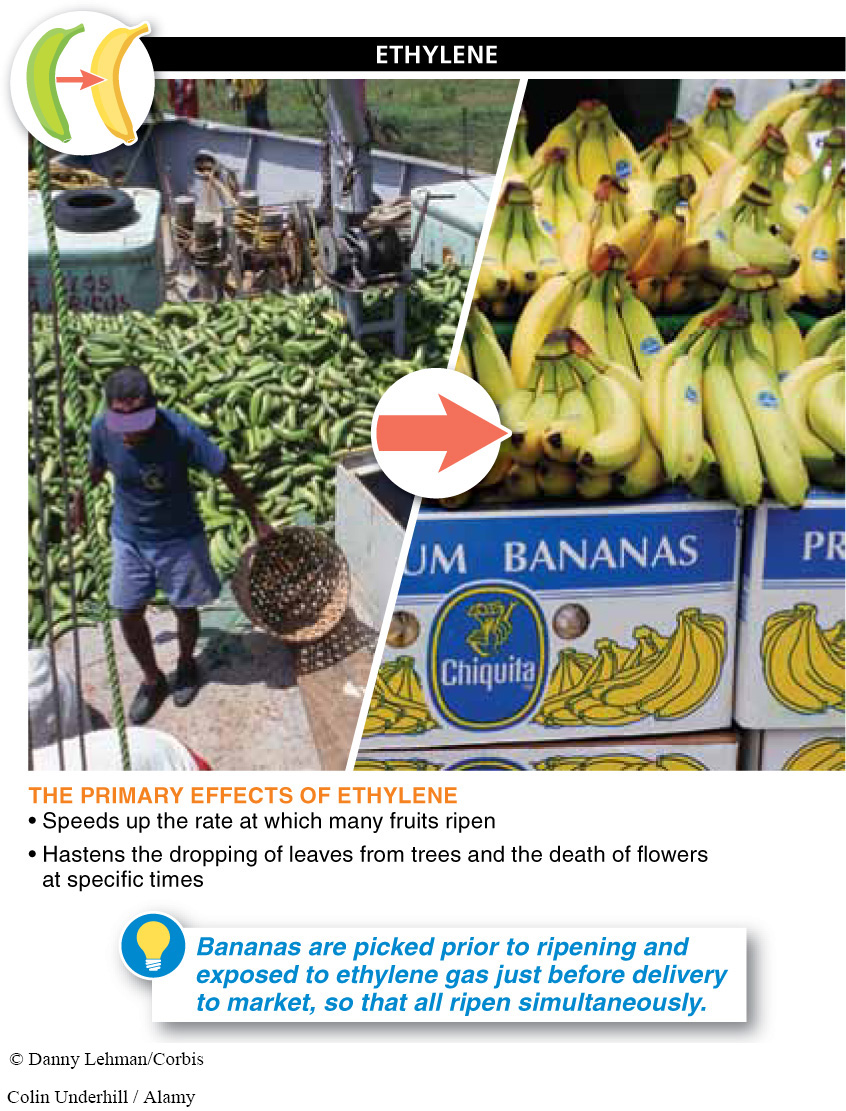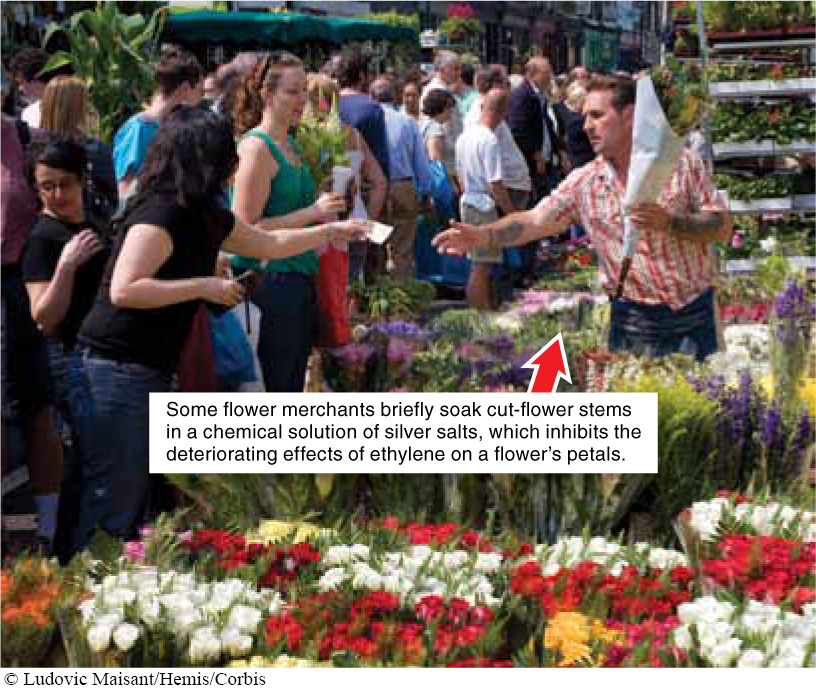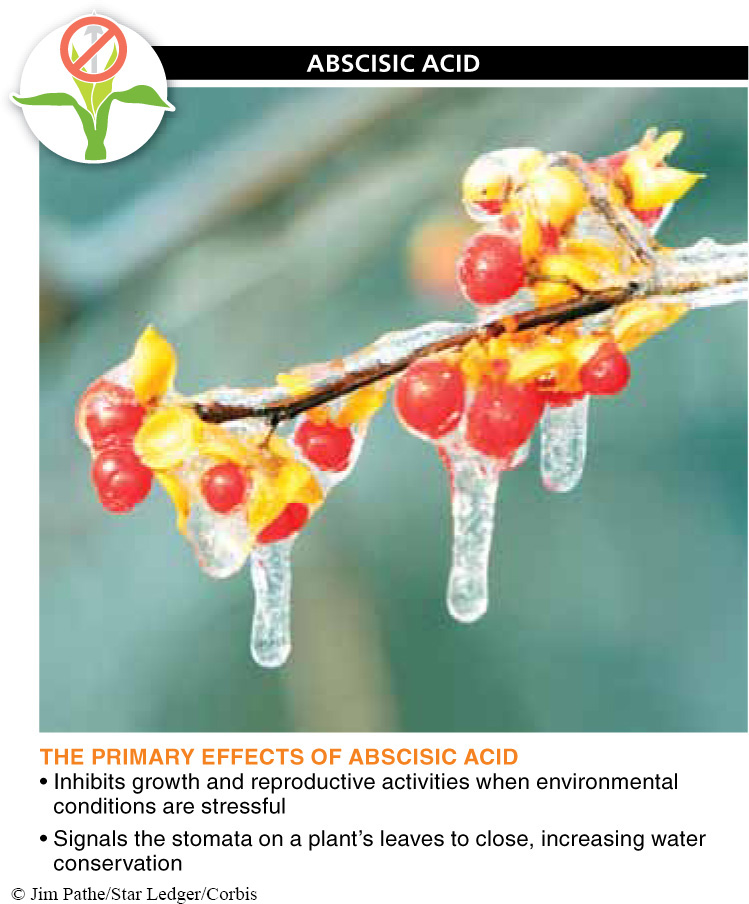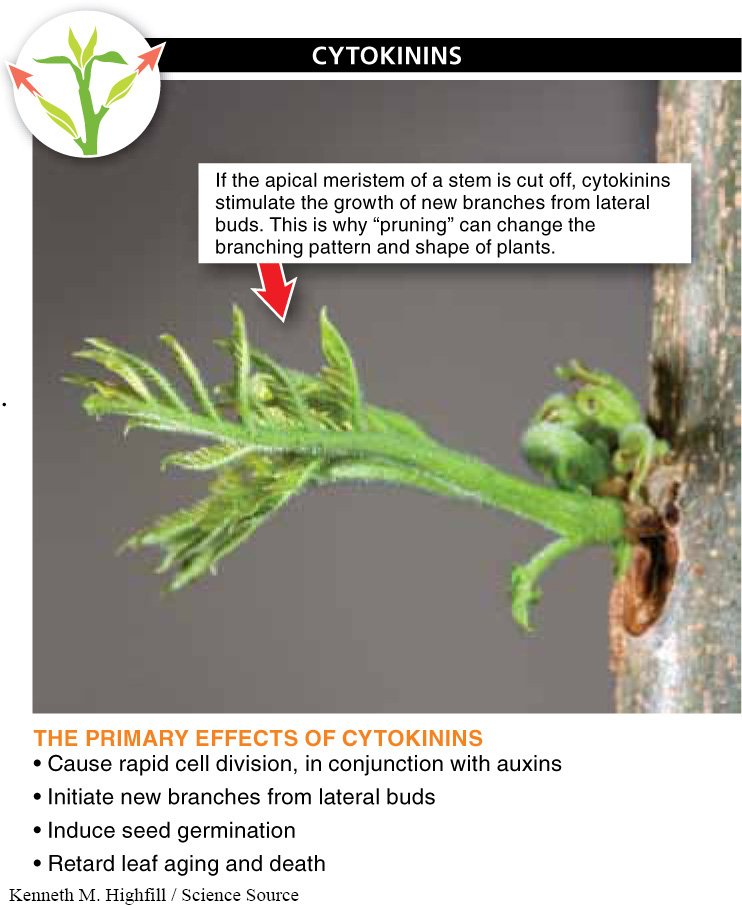Auxins and gibberellins are the primary plant regulators when it comes to growth and orientation. But there is a lot more to regulating a plant’s responses to the environment so that the plant germinates, sprouts, and fruits at just the right times. The other three types of hormones—
How can farmers ensure that every banana they ship to market ripens at exactly the right time?
Ethylene Suppose you wanted to pick 10,000 bananas in Central America and deliver them to market in the United States so that they all turned yellow at just the right time. This could be a logistical nightmare, but with the help of plant hormones it doesn’t have to be. The hormone ethylene is a gas produced in every part of a plant, and it has several important effects, including speeding up the rate at which many fruits ripen. Thus, ethylene can help you solve the banana problem: you can pick the fruits in Central America before they are ripe (when they are green), and just prior to their arrival in the United States, you can inject ethylene into the cargo hold of the ship and initiate the ripening of all the bananas simultaneously (FIGURE 19-15).

776
Not all fruits ripen in response to ethylene—
Ethylene also hastens the aging and dropping of leaves from trees and the death of flowers at specific times. A plant has to maintain a flower’s ovary until the seeds and fruit are mature, but it does not maintain the petals or stamens after fertilization. Most plants produce many more flowers than they can mature into fruits, so they use ethylene to abort some flowers to reduce the number of fruits the plant must mature. But, though beneficial to the plant, these effects can be seen as undesirable by humans, such as those who want to sell cut flowers. Some flower merchants fight the effects of ethylene by briefly soaking cut-



Recently, researchers were able to genetically engineer a type of tomato that does not produce ethylene. Ordinarily, tomatoes must be picked long before they are ripe so that they are tough enough to transport without becoming damaged. Tomatoes with blocked ethylene production can be left on the vine longer, without the risk of ripening before they can be picked and shipped to market. Ethylene is then applied so that the tomatoes are ripe when they are sold. These tomatoes grow larger and they taste more like the tomatoes someone might grow in a home garden, where they can be left on the vine until they reach perfect ripeness. Although tomatoes with inhibited ethylene production were briefly tested in the market, they have been discontinued due to patent disputes.
777
Abscisic acid Under stressful conditions, such as water shortage, the plant hormone abscisic acid is produced in relatively large amounts. Synthesized primarily in leaves, fruits, and root tips (but also in other plant parts), this hormone has the general effect of inhibiting growth and reproductive activities under adverse environmental conditions (FIGURE 19-17). In seeds, for example, abscisic acid can inhibit germination.
In effect, abscisic acid causes a plant to hunker down and ride out the difficult conditions before embarking on new growth. When roots encounter unusually dry or cold or salty conditions, the production of abscisic acid in the root increases, and the hormone travels through the plant body, inhibiting growth. It also signals the stomata on the plant’s leaves to close, thereby conserving water.
Cytokinins The cytokinins are primarily stimulators of cell division throughout the plant body and throughout the lifetime of the plant. Although they are produced primarily in the roots and fruits, cytokinins exert their influence in all parts of the plant. They usually work in conjunction with auxins to produce four main types of effects (FIGURE 19-18).
1. Causing rapid cell division and promoting primary growth.
2. Initiating new branches from lateral buds.
3. Inducing seed germination. Application of cytokinins will even cause seeds that normally germinate only in the light to germinate in the dark.
4. Retarding leaf aging and death. Even when applied to a leaf that has already fallen off a tree, cytokinins will cause the leaf to remain green longer than it otherwise would.
TAKE-HOME MESSAGE 19.7
In addition to auxins and gibberellins, three other types of hormones play critical roles in plant regulation. Among their multiple functions, ethylene induces and speeds fruit ripening, abscisic acid inhibits growth and reproduction under stressful environmental conditions, and cytokinins stimulate cell division throughout the plant body.
What physiological effect would ethylene have on unripe bananas? What about unripe strawberries?
Ethylene is a plant hormone that, among other effects, speeds up the rate at which many fruits ripen. Exposing unripe bananas to ethylene gas would initiate ripening. Strawberries, on the other hand, do not ripen in response to ethylene.
778